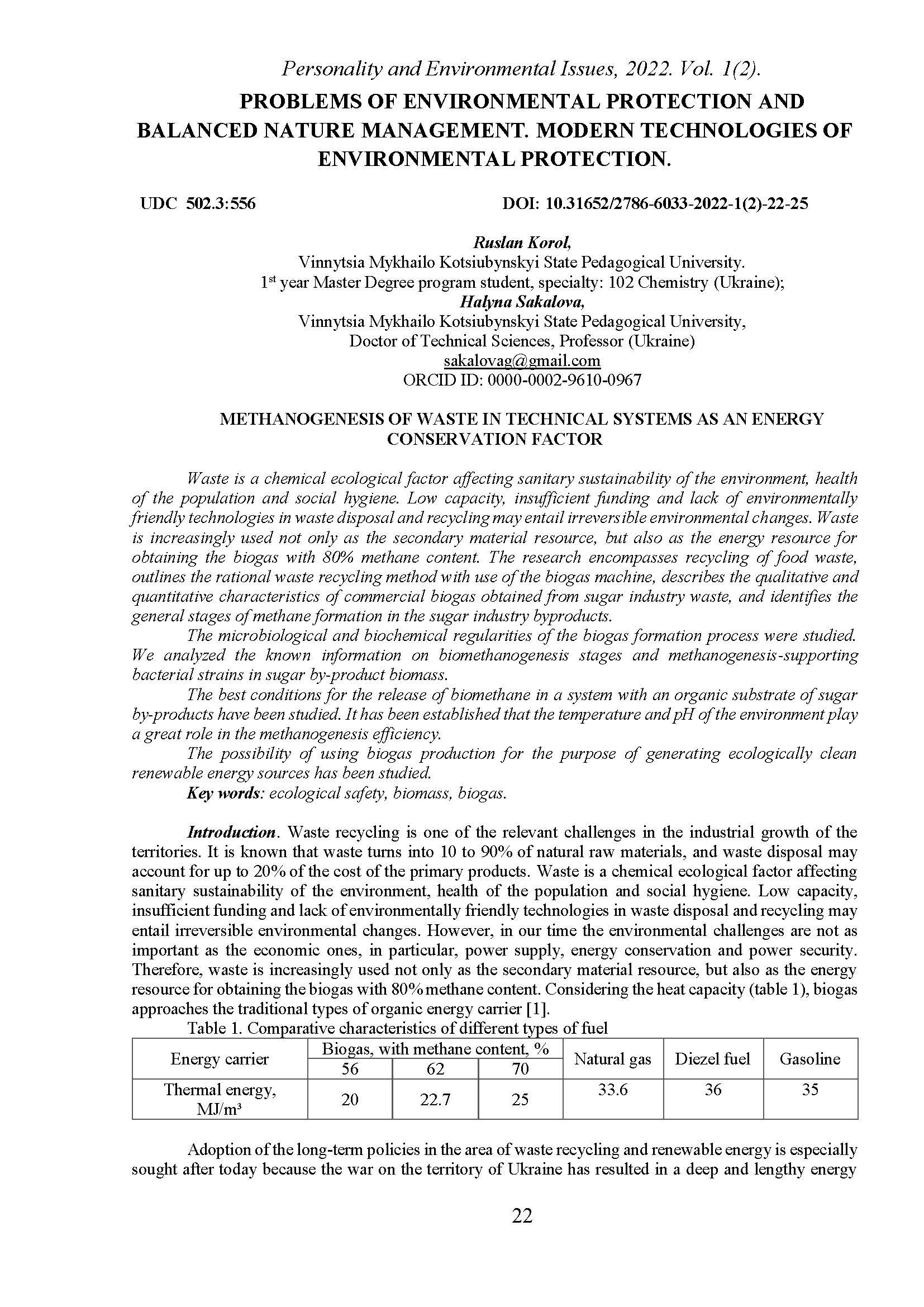Abstract
Waste is a chemical ecological factor affecting sanitary sustainability of the environment, health of the population and social hygiene. Low capacity, insufficient funding and lack of environmentally friendly technologies in waste disposal and recycling may entail irreversible environmental changes. Waste is increasingly used not only as the secondary material resource, but also as the energy resource for obtaining the biogas with 80% methane content. The research encompasses recycling of food waste, outlines the rational waste recycling method with use of the biogas machine, describes the qualitative and quantitative characteristics of commercial biogas obtained from sugar industry waste, and identifies the general stages of methane formation in the sugar industry byproducts.
The microbiological and biochemical regularities of the biogas formation process were studied. We analyzed the known information on biomethanogenesis stages and methanogenesis-supporting bacterial strains in sugar by-product biomass.
The best conditions for the release of biomethane in a system with an organic substrate of sugar by-products have been studied. It has been established that the temperature and pH of the environment play a great role in the methanogenesis efficiency.
The possibility of using biogas production for the purpose of generating ecologically clean renewable energy sources has been studied.
References
Myroslav Malovanyy, Vladimir Nikiforov, Elena Kharlamova and Alexander Synelnikov. Рroduction of renewable energy resources via complex treatment of cyanobacteria biomass. Chemistry & Chemical Technology. 2016.Vol.10, 2, P.252-254.
Tymchuk, I., Shkvirko, O., Sakalova, H., Malovanyy, M., Dabizhuk, T., Shevchuk, O., Vasylinych, T. (2020). Wastewater a Source of Nutrients for Crops Growth and Development. Journal of Ecological Engineering, 21(5), 88-96.
M. Mozaffarian, R.W.R. Zwart, H. Boerrigter E.P. Deurwaarder Biomass and waste-related sng production technologies technical, Economic and ecological feasibility. Technical, economic and ecological feasibility. 2004. № ECN-RX--04-024.
Elif Kirtay Recencnt advance in production of hydrogen from biomass. Energy conversion and management. 2011. Vol.52.
Pavlas M., Stehlík P., Oral J., Klemeš J., Kim J.K., and Firth B Heat Integrated Heat Pumping for Biomass Gasification Processing. Applied Thermal Engineering . 2010. №30. P. 120-128
Anthony C. The biochemistry of methylotrophs. N. Y.; L., 1982. 431 p.
M. Malovanyy, V. Nykyforov, O. Kharlamova, O. Synelnikov Mathematical model of the process of synthesis of biogas from blue-green algae. Ecological safety. 2015. 1(19) . P.58-63.
Myroslav Malovanyy, Volodymyr Nykyforov, Olena Kharlamova, Olexander Synelnikov, Khrystyna Dereyko. Reduction of the environmental threat from uncontrolled development of cyanobacteria in waters of Dnipro reservoirs. Environmental Problems. 2016. №1. Р. 61-64.

This work is licensed under a Creative Commons Attribution 4.0 International License.
Copyright (c) 2022 Ruslan Korol, Halyna Sakalova





